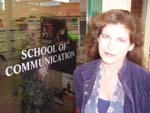 A Charles Sturt University (CSU) lecturer who previously worked with ABC journalist Sean Dorney says his expulsion from Fiji for reporting on the collapse of democracy there is a worrying development for the troubled Pacific nation and for the region.
A Charles Sturt University (CSU) lecturer who previously worked with ABC journalist Sean Dorney says his expulsion from Fiji for reporting on the collapse of democracy there is a worrying development for the troubled Pacific nation and for the region.Ms Kay Nankervis, a lecturer in broadcast journalism at the CSU School of Communication at Bathurst, who sometimes worked with Mr Dorney on his stories from Papua New Guinea and the region when she worked at the ABC TV Sydney foreign desk in the 1990s, said the suppression of media coverage in Fiji results from the reinstatement of a non-democratic regime that is attempting to maintain control by force.
“The military regime’s reaction to Sean Dorney’s reporting in Fiji is unacceptable. It is a dreadful assault on his liberty as a journalist, and an assault on the rights of the Fijian people whose changed circumstances deserve to be fully and frankly reported to them and to the world,” Ms Nankervis said.
“There is a lot of complacency about every-day media censorship in many regimes around the world, including so-called ‘democratic’ ones, but it isn’t reported because these restrictions are ‘commonplace’.
“I note with concern that the Australian journalists’ union, the Media Entertainment and Arts Alliance (MEAA), has condemned press censorship laws introduced by the regime in Fiji as making it ‘the most repressive country, in terms of press freedom, in the region, and indeed is on the road to becoming one of the worst in the world’.
“If that’s the case, the repression of media coverage in Fiji must be abhorred by everyone who believes in fairness, accountability and freedom of association, speech and thought for all people.
“The courage to report as journalists see things, rather than how authorities might like to have events recorded, is an important journalist credo, and the situation Sean Dorney finds himself in is one often faced by foreign correspondents working in countries that don’t have the same democratic freedoms as Australia.
“The role of journalism in society is an important one for journalism students to grasp before they graduate so that they can learn to report events without bowing to the wishes of an autocratic regime, or even a powerful corporation for that matter.
“I have noticed from observing my students that courageous, honest reporting is also a skill that can and should be developed in journalists from the time they enter the journalism classroom at university, and this can really only be achieved where students are given the opportunity to report real stories to real audiences, as they currently do at CSU,” Ms Nankervis said.





Social
Explore the world of social